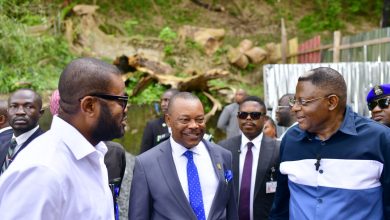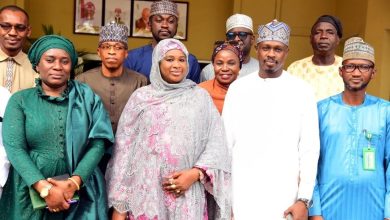Climate Change: Nigerian President, Governors charged with policies for Wastes conversion into animal feeds, energy…


President Bola Ahmed Tinubu and all the State governors have been called upon to put the necessary policies in place that will encourage local production of feed, thereby helping to reduce the cost of farming, increase yield, and ultimately ensure food security in the country.
A Waste to Wealth expert, Mr. Gregory Ohiaeri made the call during an exclusive interview with Radio Nigeria ,after a tour of a waste conversion facility in Odogunyan, Ikorodu Lagos.
Ohiaeri is the “Managing Director of, “Waste to Table Limited”, an organic waste conversion outfit that specializes in producing organic fertilizers, animal feed, and methane gas for power generation using municipal wastes.
He has for years been in partnership with the Lagos State government in managing wastes generated in the State.
Mr. Ohiaeri noted that with the right policies, organic wastes generated across the country could be converted into fertilizers, feed for farm animals, and methane gas for the generation of electricity and that it would lead to massive job creation.
While decrying the impact of the high cost of feed that caused a broiler chicken to be sold at about #15,000 last Yuletide celebrations, said the authorities must act fast to address the problem so that small holder farmers would remain in business and food would be affordable in the country.
According to him; ” If you look at the trend now, a lot of small-scale farmers are going out of business. The reason why they are going out of business is not that they are not interested in farming, it’s just that the cost of feed is affecting them a lot.
” Poultry feed is about N14,500 per 25 kg.
And if you look at all these things, it’s becoming very expensive. Last Christmas, a broiler was sold at about 15,000 naira for one, compared to before”.
He said the series of lab tests conducted on the animal feed and fertilizers produced at the Waste to Table organic waste conversion plant located at ODOGUNYAN, IKORODU, Lagos showed that they are of high quality with an increased percentage of protein.
He also said that the animals being fed on their products are doing well and that people prefer them because they taste better unlike the others fed with chemical feeds.
“We have set up our processes to test some of the feed that we produce here, using organic wastes.
” So far, the tests are looking good as revealed by the feed analysis from Alpha Lab on our chicken feed.
“As we test this thing, we have noticed that it’s doing very well. The animals are doing very well. They are growing, they are adding weight.
“I have a lot of customers that prefer to buy our animals than to buy from somewhere else because they will tell us that our animals taste different from the ones that are outside. So they prefer to come out here and buy our animals, and our animals are not as expensive as the ones you have outside. So that’s the reason why we are in business, to see how we can develop this feed locally here, and reduce the cost, and make sure that our food security is there”, he said.
Ohiaeri, who was trained in the United States, said his goal is to franchise Waste to Table in all the states of the Federation, leveraging it to ensure proper management of waste generated in the nation’s cities, while converting the waste into products to promote agriculture and power generation.
He also said that it would lead to massive job creation, especially for youths who would be working in different waste-to-wealth value chains.
“First of all, we would need to get the support of the government. We plan on franchising Waste to Table in different states to process the organic waste. So we have to have the government policy backing so that these investors will know that their investment is secure.
“Once the government buys into it, which I believe the government will do, it’s just a question of introducing the process to them. Right now, we’re doing it in Lagos state. We plan on moving to different states very soon, probably by 2024.
“The production is there for the protein, animal feed, the market is there. The market is huge. For the other products on the composting side of it, we still need to do some awareness in terms of getting the farmers to know that other alternatives are cost-efficient than chemical fertilizer”, he said.
From Lagos State, Waste to Table is expected to be established in Ogun State by 2024 as the land for building the plant has been allocated. Hopes are also high that the plant will be established in Abia State this year.
A proposal sent to the Abia State government says that among the requirements for establishing a waste conversion plant is a minimum of twenty hectares of land for dumping of wastes. According to the proposal, “By transforming waste into valuable resources, we can promote a circular economy, create green jobs, reduce pollution, and build a more resilient and prosperous society”.
During a tour of the waste conversion facility in Lagos, people watched in excitement as methane gas generated from organic wastes was used to power a generation set.
Speaking on that, Mr. Ohiaeri described methane gas as one of the leading gases responsible for causing climate change. He said organic wastes decompose easily to release methane gas and with a waste conversion plant, the gas would not be allowed into the atmosphere, but stored for use in generating electricity.
In his words,
“I am sure you’re aware of all these climate change issues. What is causing climate change is methane emissions. And organic waste is the one that decomposes quickly and emits all this methane.
So environmentally, we are processing the waste generated from the household, the cities, the businesses, and so on, and also keeping the environment clean. And then once this waste comes to our plant, we then use these different methods that we talked about, I showed you, to process it to achieve different sustainable products, which we need in the environment to also empower our farmers so that they can continue to be in business.
” So what the government needs to do for us is to put policies together.
For instance, on the waste collection, we need to put a policy that the waste can be segregated from the source. That would be a big plus. So that when it comes here, we don’t have to start sorting all over.
So it’s sorted already, and based on the waste coming in, we can then divert it to the different methods that we talked about to achieve these things. And government should also give us access to land because our process is required. We use windrow processing for composting”.
At the facility were ponds with over three thousand catfish fingerlings stocked, pigs, rabbits, and different species of chickens. The animals are used for testing the efficacy of the animal feed and organic fertilizers produced at the Waste to Table Organic Wastes Conversion facility.
Discover more from Radio Nigeria Lagos
Subscribe to get the latest posts sent to your email.




